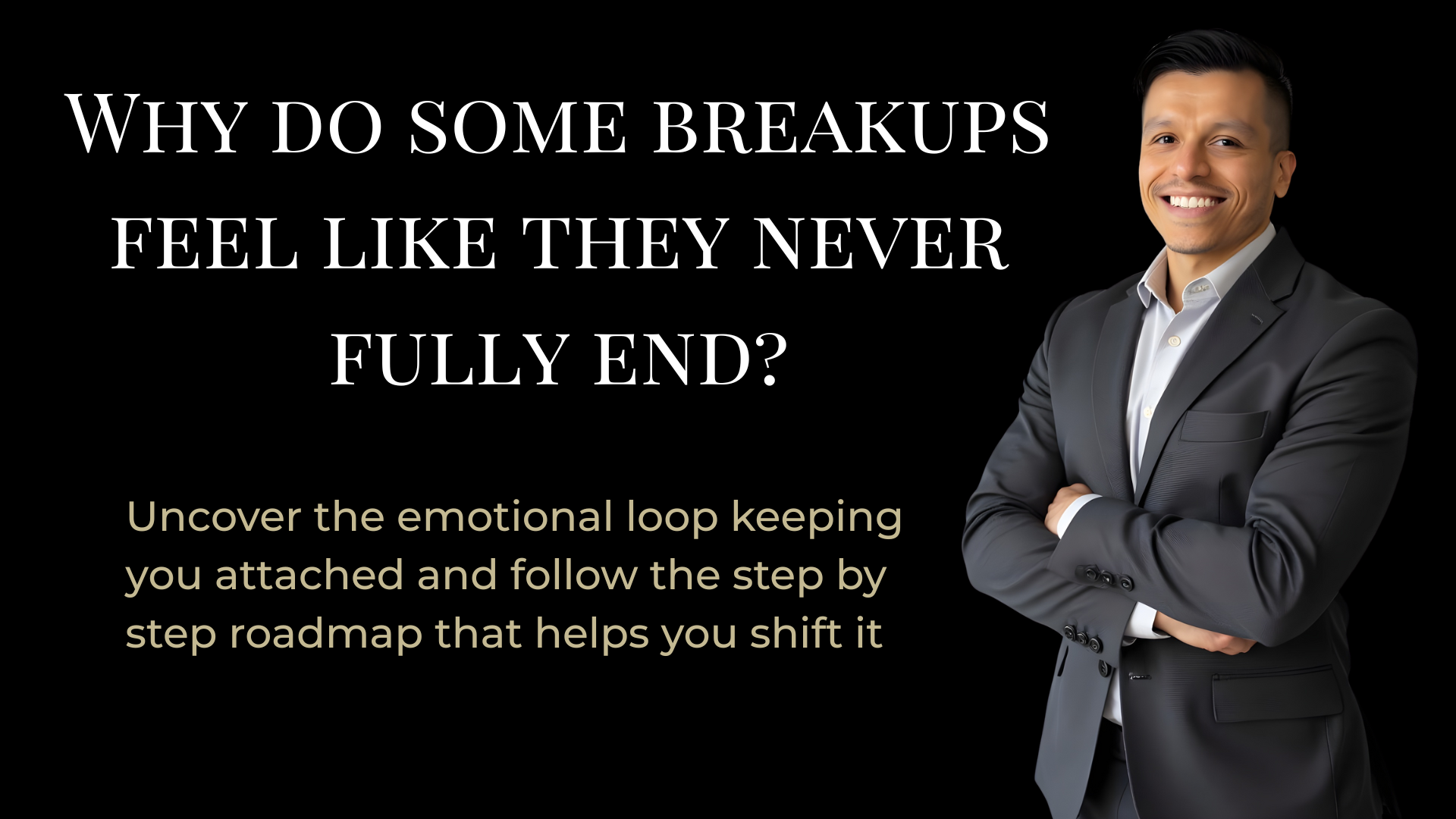
The Uncomfortable Truth About Why You're Still Single After Your Breakup
You've done everything right. Built a career people envy, maintained the body, showed up to therapy, downloaded all the apps. Yet somehow, you're still stuck watching everyone else find their person while you're left wondering what the hell is wrong with you. Here's the truth nobody wants to say out loud: your success might actually be part of the problem.
That stings, doesn't it? Because you've spent your entire adult life being told that achievement solves everything. Get the promotion, level up your life, and love will naturally follow. Except it hasn't. And the longer you stay single after that last relationship ended, the more the gap between your professional wins and your romantic reality starts to feel like a personal failure you can't fix with another accomplishment.
The real issue isn't that you're unlovable or broken. It's that the same drive that got you to the top of your career has created patterns that actively push connection away. And until you see these patterns clearly, you'll keep wondering why everyone else seems to figure out love while you're still swiping through the same disappointing options.
The Achievement Trap That Nobody Talks About
Think about how you built your career. You identified problems, created solutions, optimized systems, and pushed through obstacles with sheer determination. Emotions were something you managed around, not something you moved through. Vulnerability was a liability in the boardroom, so you learned to lead with competence instead of openness.
This approach works brilliantly for climbing corporate ladders. It fails spectacularly in creating intimate connection.
Here's what happens: you bring that same problem-solving energy to dating. Someone triggers an old wound from your ex, and instead of feeling it, you analyze it. You create strategies for connection instead of actually connecting. You present the polished version of yourself, the one that's learned to perform success, while the parts of you that actually need to be seen stay carefully hidden.
The men who match with you can sense something's off, even if they can't name it. They're meeting your representative, not you. And while that representative is impressive as hell, he's not someone they can fall in love with because he's not actually real. He's the armor you built to survive your last heartbreak, and now that armor is keeping everyone at exactly the distance where it can't hurt again.
You've become so good at protecting yourself that you've forgotten how to be reached.
The Invisible Walls You Built Without Realizing It
After your breakup, something shifted. Maybe you didn't fall apart the way you expected. Maybe you threw yourself into work, into fitness, into becoming an even better version of yourself. You told yourself you were recovering, moving forward, becoming stronger. And you were, in many ways.
But here's what nobody mentions about that kind of recovery: sometimes what looks like strength is actually avoidance with better branding. You got really good at staying busy, at filling every moment with productivity and purpose, because staying still meant feeling things you weren't ready to feel.
Those feelings didn't disappear. They just went underground, where they quietly started running the show. Now they show up as the guy who seems perfect on paper but triggers a vague sense of unease. Or the sudden loss of interest right when things start getting serious. Or the pattern of choosing men who are emotionally unavailable in the exact ways that feel familiar from your last relationship.
Your body remembers what your mind wants to forget. It remembers how it felt to be blindsided, to trust completely and have that trust shattered, to believe you'd found your person only to discover you were alone in that belief. So now it's trying to protect you the only way it knows how: by making sure you never get close enough to hurt like that again.
This isn't weakness. It's not dysfunction. It's your nervous system doing exactly what it was designed to do. The problem is that the protection you needed six months ago, or a year ago, or five years ago, is now the prison keeping you from what you actually want.
Why Your Usual Strategies Aren't Working
You've probably tried fixing this the way you fix everything else. Read the books, listened to the podcasts, maybe even worked with a coach or therapist. You've analyzed your attachment style, identified your patterns, understood the psychology behind your choices. You know the theory backward and forward.
Yet knowing why you do something doesn't automatically change the doing of it. Understanding your avoidant tendencies doesn't make you suddenly comfortable with vulnerability. Recognizing that you chase emotionally unavailable men doesn't stop you from feeling that familiar pull toward the next one who fits the pattern.
This is where high-achievers get stuck in a particularly painful loop. You're used to being able to think your way out of problems, to logic and discipline your way to better outcomes. But recovering from heartbreak and rebuilding your capacity for connection isn't an intellectual exercise. It's a somatic, emotional, relational process that requires you to do the one thing your success never demanded: surrender control.
Traditional dating advice treats you like you have a skills problem. "Be more confident. Show interest but don't seem desperate. Wait three days to text back." As if the issue is that you don't know the moves. But you know the moves. You've mastered the moves. The problem is that you're dancing alone, performing connection instead of risking it.
What you actually need isn't more strategy. It's permission to stop strategizing long enough to feel what's underneath the need for control. That's terrifying for someone who's built their entire identity on being the person who has it together.
The Pattern That Keeps Repeating
Picture how your last few attempts at dating have gone. There's usually an initial spark, a few weeks or months where things feel promising. You're excited, optimistic even. Maybe this one will be different. Maybe you've finally processed enough to be ready.
Then something shifts. He gets busier, or you get busier. The texts become less frequent. Plans get more vague. One of you starts pulling back, and the other responds by either pursuing harder or matching the distance. The connection that felt so natural at the start now feels like work, like you're both trying to force something that's already dying.
Eventually, it fizzles out. Maybe there's a conversation about it, maybe it just dissolves into mutual ghosting. Either way, you're left with that familiar cocktail of relief and disappointment. Relief because you didn't have to risk getting hurt again. Disappointment because deep down, you know you never actually showed up fully enough for it to work.
Then comes the part where you tell yourself the story. He wasn't ready for something serious. The timing was off. You weren't compatible anyway. These things might even be true on some level. But they're also convenient ways to avoid looking at the deeper pattern: you keep choosing situations that confirm your fear of being hurt rather than challenging it.
This isn't about blaming yourself. It's about recognizing that your heart is trying to protect you in ways that made sense when you were in survival mode but now actively sabotage what you're trying to build. Until you address what's actually happening underneath these patterns, you'll keep recreating the same story with different actors.
What Recovery Actually Requires
Real recovery from heartbreak isn't about becoming invulnerable to pain. It's about building the capacity to feel pain without letting it destroy you. It's learning that you can survive being hurt again because you've already survived it once and discovered you're more resilient than you thought.
This means actually processing the grief you bypassed when you dove into self-improvement instead of falling apart. It means feeling the anger you intellectualized away because you wanted to be the bigger person. It means acknowledging that part of you is still waiting for your ex to realize what he lost, and that keeping that fantasy alive prevents you from fully showing up for anyone new.
For high-achievers, this process feels impossibly inefficient. You want the roadmap, the timeline, the measurable milestones that prove you're making progress. But recovering from heartbreak is messy and nonlinear. You'll feel fine for weeks, then something random will gut you out of nowhere. You'll have breakthroughs that feel revolutionary, then find yourself acting out the same old patterns.
This isn't failure. It's how deep change actually happens. You're rewiring neural pathways that have been running the same loops for years, maybe decades. You're teaching your body that intimacy doesn't always end in abandonment, that vulnerability doesn't always lead to betrayal, that loving someone doesn't automatically mean losing yourself.
That kind of transformation can't be rushed or optimized. It requires something most successful men rarely allow themselves: patience with their own process, compassion for their own timeline, and trust that not everything worth doing needs to be done efficiently.
What Changes When You Actually Do The Work
When you genuinely move through this process instead of around it, something fundamental shifts. You stop seeing potential partners as threats to manage or problems to solve. You start recognizing red flags without immediately blaming yourself for being attracted to them. You become able to feel attraction without immediately spinning it into a story about your future together.
The dating landscape starts to look different because you're different. The emotionally unavailable men who used to feel exciting now just feel exhausting. The men who are actually available and interested, who you used to dismiss as boring or too eager, suddenly become visible in a way they weren't before.
You find yourself having conversations where you're actually present instead of performing. Moments of genuine connection stop feeling dangerous and start feeling like coming home. The vulnerability that used to feel like weakness becomes the thing that creates the depth you've been craving.
This doesn't mean you suddenly become perfect at dating or that every connection works out. It means you stop approaching each interaction like you're trying to prevent disaster and start showing up as someone capable of handling whatever happens. That shift changes everything.
The men you attract start reflecting this change. They're more emotionally available because you're more emotionally available. They're more willing to be vulnerable because you've learned to create space for vulnerability without immediately needing to fix or control it. They can sense that being with you doesn't mean they have to fit into some predetermined box of who you need them to be.
Why You Can't Skip This Part
Here's the uncomfortable truth underneath all of this: you already know most of what I'm saying. You've probably had these exact realizations before, maybe multiple times. You've recognized your patterns, understood where they came from, committed to doing things differently.
Yet here you are, still single, still stuck, still wondering when it gets to be your turn. Not because you're defective or because you haven't tried hard enough. But because knowing what needs to change and actually changing it are entirely different processes.
The gap between insight and transformation is where most people live indefinitely. They collect understandings like trophies, hoping that enough awareness will eventually equal change. But your nervous system doesn't shift because you've read the right book or understood the right concept. It shifts through embodied experience, through feeling what you've been avoiding, through building new patterns that contradict the old stories your body believes about connection.
This is why you can't think your way out of this. Why another strategy or framework or optimization won't solve it. The work that actually creates change happens at a level underneath thought, in the places where your body has been quietly running the show without your conscious mind's permission.
Until you're willing to meet yourself there, in those uncomfortable places where all your success and achievement can't protect you, the patterns will keep running. Different faces, same dynamic. Different circumstances, same outcome. Different explanations, same underlying truth: you're terrified of being hurt again, and that fear is making all your choices for you.
What Comes Next
The question isn't whether you're capable of creating the relationship you want. You already know you are. You've built a career, transformed your body, overcome obstacles that would have stopped most people. Your capacity isn't in question.
The question is whether you're willing to do the kind of work that doesn't show up on a resume. Whether you can allow yourself to be messy and uncertain while you figure this out. Whether you're ready to stop protecting yourself long enough to actually be seen by someone who might matter.
This process has a structure. There are specific steps that take you from where you are now to where you want to be, from protected and alone to open and connected. It's not about becoming someone different. It's about releasing the armor that's keeping the real you hidden, reclaiming the parts of yourself you abandoned to survive your last heartbreak, and rebuilding your capacity for the kind of connection that doesn't require you to diminish yourself to maintain it.
The framework exists. The path is clear. What's required is the willingness to walk it, even when it feels vulnerable, even when your mind screams at you to retreat back into the familiar safety of staying busy and staying protected.
You've spent enough time wondering why this keeps happening. You've done enough analysis of what went wrong. The intellectual understanding is maxed out. What's needed now is a different kind of work, the kind that actually moves the needle instead of just making you feel like you're doing something productive.
That work starts with acknowledging that where you are right now makes complete sense given what you've been through. And it continues with learning that there's a way forward that doesn't require you to either stay protected forever or risk being destroyed again. There's a middle path where you get to be both powerful and vulnerable, both successful and deeply connected.
You just have to be willing to do what it takes to find it.
Ready to Break Free from Heartbreak?
Discover the Proven Steps to Rebuild Confidence and Thrive in Life After Love.
Join a Community That Gets You and Helps You Thrive!
Join a community of high-achieving gay men receiving exclusive tools, tips, and support to overcome heartbreak and create a life they love.
We respect your privacy. Your information is 100% secure and will never be shared, sold, or used for spam. You can unsubscribe at any time.


